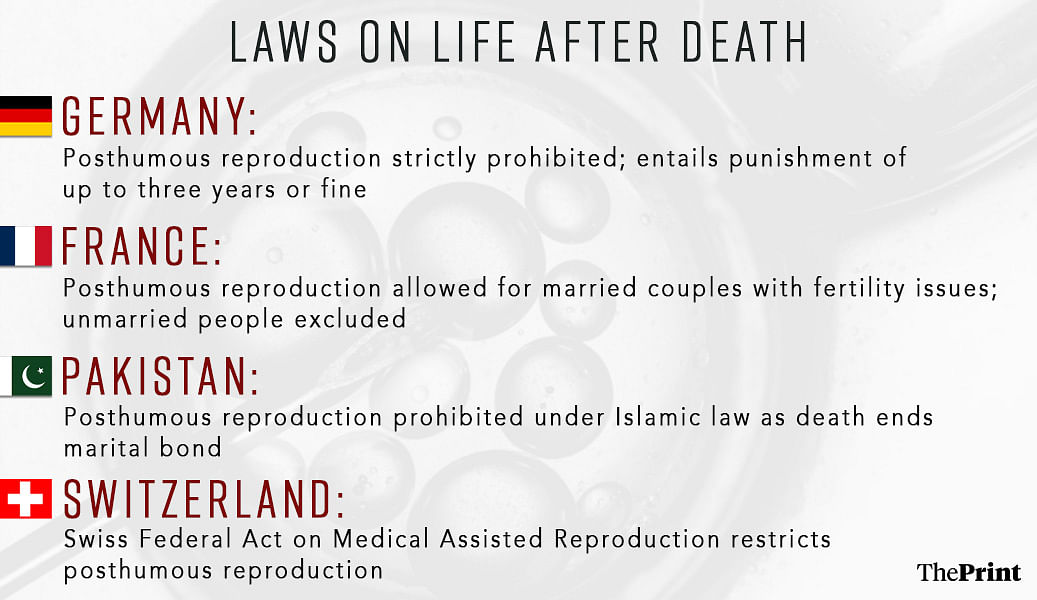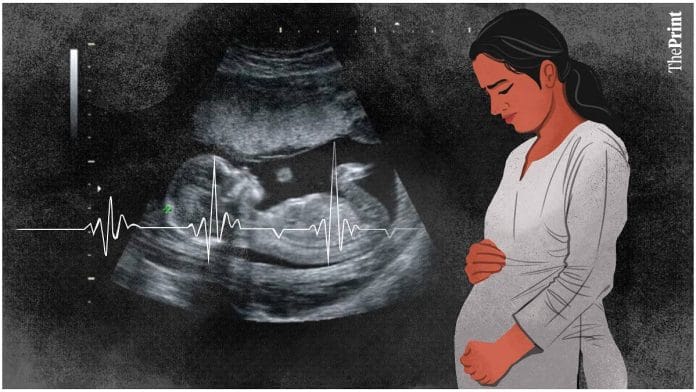New Delhi: The Delhi High Court last week paved the way for posthumous reproduction in India by allowing the parents of a deceased 30-year-old man access to his frozen sperm so they can have a grandchild through surrogacy.
The court directed Sir Ganga Ram Hospital in New Delhi to hand over the frozen semen sample stored in its fertility lab to the parents, saying it “constitutes property and the parents are the legal heirs of their deceased son”.
Simply put, the ruling enables a deceased man’s frozen semen sample to be considered equivalent to property, which his family members can then inherit.
The couple’s son had frozen his sperm 4 years ago before he began treatment for Non-Hodgkin’s lymphoma, a form of cancer, but after his death, the hospital declined to release the sample to his parents who wanted to carry on his “legacy”.
“Under the prevailing Indian law, there is no prohibition against posthumous reproduction if the consent of the sperm owner or egg owner can be demonstrated,” Justice Prathiba M. Singh said in the landmark 4 October judgment.
The court noted the absence of relevant statutes and laws on the subject, saying the current Assisted Reproductive Technology (Regulation) Act, 2021 and the Surrogacy (Regulation) Act, 2021, were insufficient to deal with the case.
In the absence of posthumous reproduction laws, the High Court’s ruling relied on the definition of property under Indian laws that say ‘property’ includes both tangible and intangible property.
The court attempted to answer whether semen could be equated to a deceased’s property or form part of his estate by using the Black’s Law Dictionary definition of the term ‘property’ as “any external thing over which the rights of possession, use, and enjoyment are exercised”.
Based on this, the court applied three tests to determine if the sperm sample constituted property: anything capable of possession or being used and enjoyed or being disposed of, would constitute property, it said.
“Applying these three tests to a semen sample, which also constitutes a gamete in terms of Section 2(g) of the ART Act, 2021, semen can be owned and possessed within the body and outside of it as well,” the court said. Section 2(g) of the 2021 Act defines “gamete” to mean sperm and oocyte.
“Modern technology has made it possible for a sperm sample to be preserved, stored and used even at a later date. It can be used for the purposes of enabling procreation,” it added.
In the absence of posthumous reproduction laws in India and “no international consensus” on the posthumous reproduction issue, the judgment delved into different precedents laid down by courts across the world.
The court analysed Australian statutes like the Human Tissue Act 1982 and the Assisted Reproductive Treatment Act 2008 as well as decisions by various courts like the Court of Appeals, California; the Supreme Courts of the state of New York, British Columbia, the Australian Capital Territory and New South Wales
Posthumous reproduction laws vary across the world. It is banned in some countries while others allow it with regulation.
Countries like Uruguay, Belgium, Australia (Victoria), Canada and the UK allow the practice in some form or another, but they have legal requirements ranging from written or oral consent to written agreements, presence of witnesses and review by a panel.

ThePrint delves into the legal position on posthumous reproduction in different countries through different cases and statutes.
Also read: Why Delhi HC’s ruling allowing parents custody of deceased son’s sperm will set precedent
The US
Posthumous reproduction rules in the US vary. The Supreme Court of New York and the Court of Appeal, California have allowed it in certain cases. However, the American Society for Reproductive Medicine also has ethical guidelines allowing its practice only if the deceased gives consent, the partner is properly counselled and the donor has been screened for infections.
One of the landmark cases in the US was Hecht vs Superior Court (1993) in which the California Court of Appeal ruled that a deceased man’s sperm be given to his partner and not destroyed, as requested by his children.
The deceased man had stored his sperm in a sperm bank and left instructions that his partner was entitled to it in case she wanted to have a child.
The case reached the higher California Court of Appeal after the woman challenged a County Court order to destroy the sperm.
The Court of Appeal considered two issues. Firstly, it looked at whether the claimant had an interest or the right to own the sperm. And secondly, it examined whether there was any public policy prohibiting posthumous artificial insemination of a woman who wasn’t married, especially at the instance of the deceased’s children.
The court ruled that the deceased at the time of his death had ownership over sperm and “decision-making authority” over how it ought to be used for reproduction. The court also said the sperm was considered property.
“As a matter of law, it is reasonable to assume that the gamete providers have primary decision-making authority regarding pre-embryos in the absence of specific legislation on the subject. A person’s liberty to procreate or to avoid procreation is directly involved in most decisions involving pre-embryos,” the court said.
The 1993 decision relied on another 1992 ruling, Davis vs Davis, where the same court observed that sperm stored with the intent to use for artificial insemination is unlike other human tissue because it is “gametic material”, which can be used for reproduction.
The UK
In the UK, posthumous reproduction is allowed only with written and signed consent.
In 1982, a UK High Court held that the dead body of a human being could not be regarded as property, but this position evolved over time as reflected in decisions by the UK High Court of Justice and the Court of Appeals.
In Elizabeth Warren vs Care Fertility (2014), the High Court of Justice (Family Division), UK, allowed ski instructor Warren Brewer’s widow to use his sperm to have his child if she wanted.
Elizabeth Warren had challenged a storage time limit on the use of her husband’s sperm which left her little time to conceive.
Diagnosed with a brain tumour in 2005, Brewer stored his sperm before starting radiotherapy due to the risk of infertility and named his partner as the intended recipient for its posthumous use.
Although Brewer froze his sperm before he died in 2012, fertility regulations said it couldn’t be stored beyond 2015 as the deceased’s written consent did not specifically extend to storing the sperm beyond the regulated statutory period.
His widow won the case and the court granted her up to 55 years until the year 2060 to use it for conceiving a child.
Although the court noted that there was no conflict between individual rights in this case, the situation got complicated because of the storage time limit issue.
Relying on Article 8 of the European Convention on Human Rights (ECHR) on the right to respect for private and family life, Warren argued that she had the right to become a parent by her deceased husband, which also aligned with his wishes.
Recognising her right under the ECHR, the court acknowledged that the deceased was not given the necessary information or opportunity to provide consent for extended storage beyond the statutory period.
In another case in 2016, M vs Human Fertilisation and Embryology Authority or the HFEA (2016), the UK Court of Appeal (COA)—the second most senior court in England and Wales—allowed a 60-year-old woman to use her dead daughter’s eggs to give birth to a grandchild.
Her 21-year-old daughter who wanted to have children had her eggs retrieved and stored in 2008 before she died of cancer.
In the absence of a partner, the woman’s mother offered to carry her children, following which she consented to the posthumous use of her eggs. However, the problem was that she couldn’t complete the necessary consent forms for the use of a donor’s sperm.
After her death, her parents sought to fulfill her wish to have children with the help of an anonymous sperm donor from a New York sperm bank, but met with obstacles.
The High Court of Justice—which deals with high-value and important civil law cases, and has supervisory jurisdiction over most subordinate courts and tribunals—refused the application of the deceased’s parents to export their late daughter’s eggs to the US.
However, when this decision was challenged before the UK Court of Appeals—which only hears appeals or challenges to decisions of other courts and tribunals—it relied on the 2010 ruling in Yearworth vs North Bristol NHS Trust, where six people diagnosed with cancer had stored their gametes.
The Court of Appeal, in that case, ruled that sperm did amount to property and could be legally owned by persons. It went on to add that since the sperm was damaged, the six people were entitled to claim damages under the law of contract.
Canada
The Delhi High Court cited an important 2016 Supreme Court of British Columbia ruling in K.L.W. vs Genesis Fertility Centre, where a woman sought the release of her husband’s semen sample after his death.
The husband had his sperm extracted, frozen and stored before he died.
The court based its decision on three questions: One, did reproductive material amount to property; and two, if it did, can such material be passed to the petitioner as the sole beneficiary?
The third question was whether the court could order the release of reproductive material to the wife in the absence of his written consent.
Observing that the husband died without making a will and his only heir was the spouse, the court said that while the husband didn’t provide any written consent for the use of the reproductive material, had this requirement been brought to his notice, he would have given his consent.
The court also held that the spouse was the only heir in this case and thus the sole beneficiary of his property. As long as the sperm was not to be sold, it could be released to the spouse, the court ruled.
The court also referred to the Canadian Assisted Human Reproduction Act, 2004, saying it was fundamental to governing ART procedures in Canada.
Under the Act, ‘human reproductive material’ means “a sperm, ovum or other human cell or a human gene, and includes a part of any of them”.
Australia
Posthumous reproduction is allowed in Australia with some conditions and is governed by the Human Tissue Act 1982 and Assisted Reproductive Treatment Act 2008.
Under Australian rules, people whose partners have died, regardless of gender, are required to have obtained written or oral consent for posthumous reproduction in the presence of two witnesses. Additionally, it must be approved by a Patient Review Panel.
In a prominent case in Australia in 2015, Roblin vs The Public Trustee for the Australian Capital Territory, the question before the Supreme Court of the Australian Capital Territory was whether stored sperm formed part of a deceased person’s estate.
The court said ova and sperm are human tissues and directed them to be considered property. It also added that the ownership of such property, which was originally with the deceased person, would flow to the legal representatives and form part of his estate.
(Edited by Sugita Katyal)







Surrogacy should be banned. Selling of a women’s womb for money is immoral and unethical. Who will take care of this child when the grandparents pass away? The child will grow fatherless and motherless.